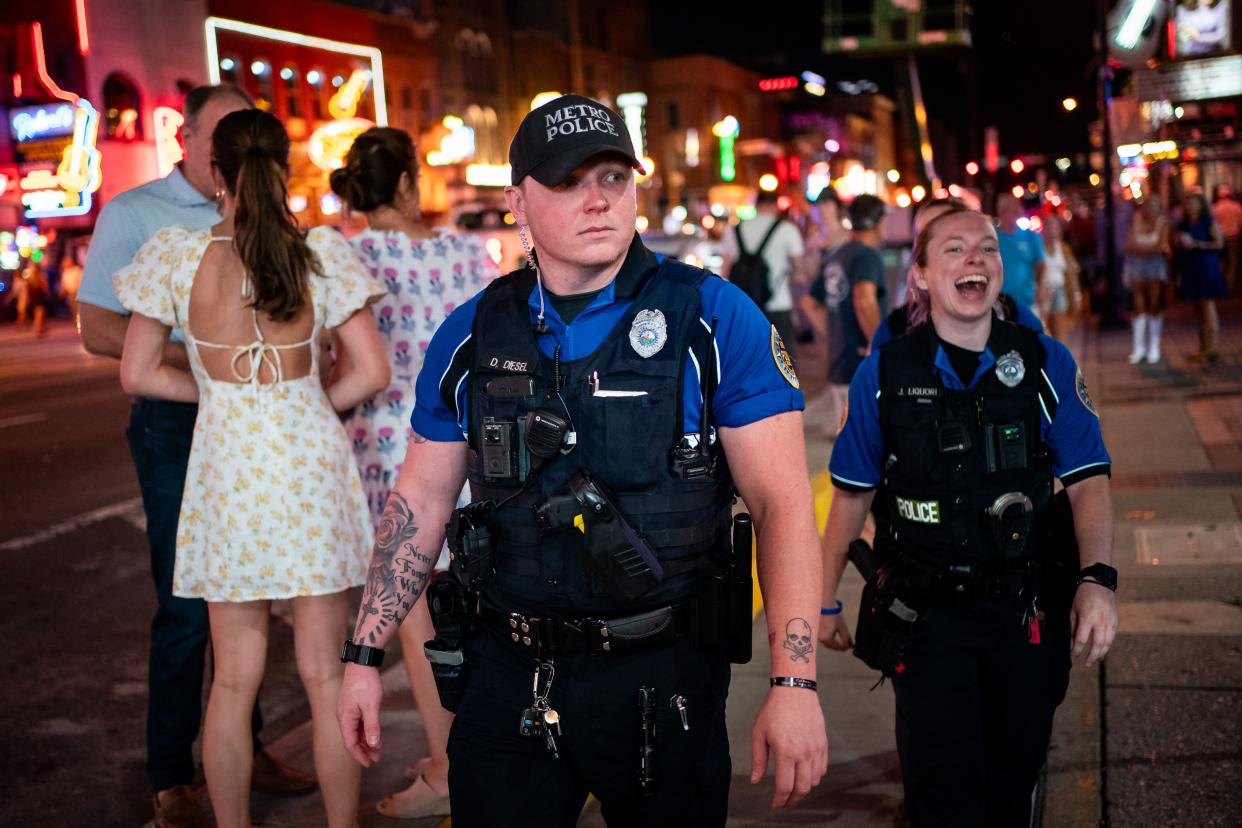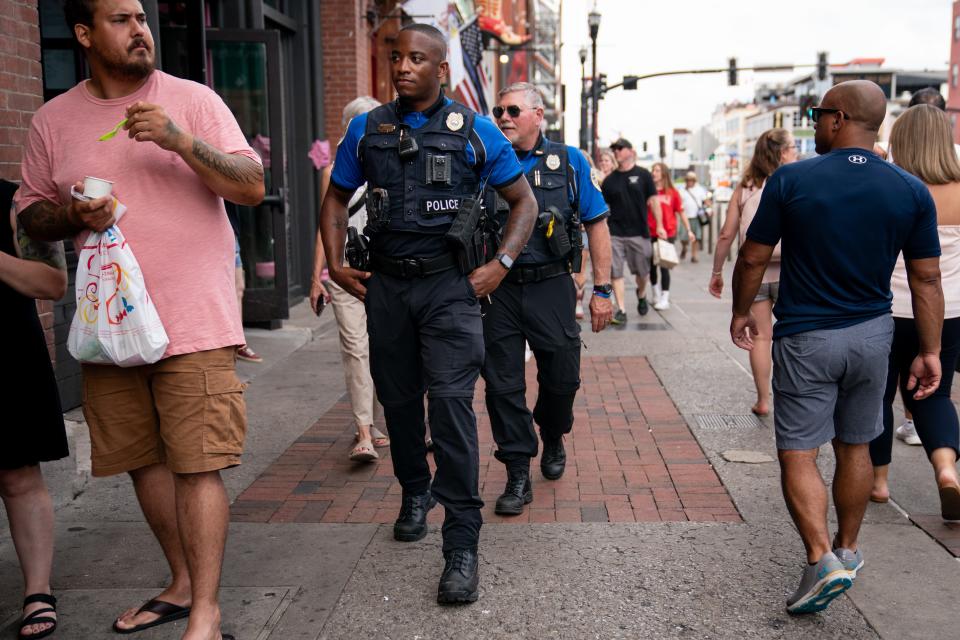Is Nashville's Lower Broadway safe? What we saw walking alongside police

Before stepping out of his patrol car, Lt. Paul Stein pulled out a roll of stickers shaped like the Metro Nashville Police Department badge. He folded them accordion style and tucked them into his breast pocket.
He then stuck his hand into a clear bag full of blue rubber bracelets and stuffed them into his pants pocket.
"Have to stock up for the kids," Stein said.
Stein wore a standard-issue polo — concealed by an equipment vest — tactical pants and boots. He shaded his eyes with aviator sunglasses. His tightly trimmed goatee complimented his gray head.
He was ready for a long, noisy, busy night shift on Lower Broadway.
Stein is a 19-year-veteran officer, a freshly minted lieutenant tapped to command the Metro Nashville Police Department’s Entertainment District Unit. He’s also a people person, which explains why he’s one of the new faces of community policing in Nashville.
After all, sometimes even cops gotta pose for selfies.
"Broadway is definitely a different experience from what I've been used to my entire career," said Stein, who has lived in Nashville for a decade. "I joke that there's a lot of bachelorette parties that wake up in the morning and roll through their camera and see this face and are like, 'Oh my gosh, what did I do?'"
His unit, along with its new version of policing, is charged with ensuring Nashville's $9 billion tourism industry cleans up its nightly act. After all, crime here is under intense scrutiny from city and state leaders, as well as from longtime residents.
Meanwhile, supporters of Lower Broadway want to ensure this international destination doesn't reverse its immense popularity.
This is all fairly new to Stein — and Nashville. Lower Broadway has hosted musical acts for nearly a century, but the present-day, world-famous, bachelorette-party, neon phenomena has picked up steam in recent years.
Fixing Lower Broadway: Why even Nashville tourists think downtown's vibe is off
In a generation, Broadway has transformed from a dilapidated downtown thoroughfare to an adult theme park, complete with misdemeanor trappings. In November, Butch Spyridon, then-CEO of the Nashville Convention and Visitors Corp., said the downtown experience was souring because of the lack of policing on busy nights.
Enter the men and women of the Entertainment District Unit.
Within days of Spyridon’s public declaration, the Metro Nashville Police Department committed 30 officers, four sergeants and a lieutenant to the newly formed unit. They all work Lower Broadway, including Stein. If there's paperwork to be done, they work through it quickly and rejoin the team on the street.
The system is a lot better, Officers Dennis Diesel and Jennifer Liquori said, but not perfect.
"Before, we were more reactive," Liquori said of policing on Lower Broadway.
How do Nashville's efforts compare to other tourist destinations?
Three hours southwest of Music City, similar public safety efforts have reached Beale Street, the famous three blocks of nightclubs, restaurants and shops in downtown Memphis. And then there’s Bourbon Street in New Orleans, one of the oldest entertainment districts in America, with its open containers, late night revelry and balcony theatrics.
Three tourism destinations. Three public safety challenges.
Sensory overload on Lower Broadway
Diesel leaned into the passenger window of Officer Dani Thompson's patrol car on Lower Broadway, one of five units parked between Fourth Avenue and Rep. John Lewis Way.
On this Thursday night, the neon of Lucky Bastard Saloon, Robert's and Tootsies reflected off the windshield while the car threw blue strobe lighting on the sidewalks. Thompson double-checked a face to a name on a warrant. She's particularly adept, her colleagues said, at remembering people, and leads the unit in warrant arrests.
Soon the pair, along with Liquori, were off to find the man.
Tourists parted as the officers walked with purpose down the street toward Walk of Fame Park. The sidewalks were packed with bodies flowing in and out of restaurants and honky-tonks. Even after the sun sets, it is hot and sticky.
Music hammered eardrums within the four-block stretch. Sensory overload.
'A money making machine': Is Nashville's iconic Lower Broadway losing its music soul?
The officers didn't find the man. But their presence, evenly divided between the blocks of Lower Broadway, is a deterrent for would-be criminals.
These Nashville police officers are more than crime fighters. They’re ambassadors for the city. In many cases, they're the only law enforcement personnel tourists will encounter.
Bar bouncers greeted the officers with a clasping of hands and pats on backs. Visitors thanked them for their service and asked for selfies and directions. Unhoused residents turned and walked the other way or greeted them warmly.
The officers knew them by name.
Five months after the launch of the special unit, officers said there are far fewer people loitering and selling drugs on Lower Broadway’s corners. And police are often in position to catch suspected thieves seconds after they walk — or run — out of stores.
Is Lower Broadway in Nashville safe?
In Nashville, crime this year in the 37201 ZIP code, which covers a four-block swath from Korean Veterans Boulevard to Jefferson Street, has decreased when compared to 2022. (The unit only covers Lower Broadway and Printer's Alley in that ZIP code.)
From August 2022 to July 17 of this year, about 1,200 crimes were reported to MNPD in that stretch of downtown — 86% of which were property crimes.
During the year prior, more than 1,400 crimes were reported.
This occurs after the previous two years saw a sharp decrease in reported crimes when tourism was stifled during the pandemic.
Exploring Downtown: Where to eat on Lower Broadway (or just a block or two off), according to a local
Stein said his officers in the Entertainment District Unit have made about 350 arrests through the end of June.
For the time period the Entertainment District Unit has been on patrols, there have been 583 crimes reported — 200 less than the same period in 2022.
Only on the streets for about five months, it’s too soon to say by the numbers what impact the unit is having on Lower Broadway, but anecdotally, it appears to be working.
Lower Broadway crime reports higher than Beale Street
Despite the improvements, reported crimes on Lower Broadway are higher than on Beale Street. In Memphis, approximately 14,000 people explore the famed street every day, said Jon Shivers, director of the Beale Street Historic District.
Between August 2022 and July 22 of this year, the Memphis tourist destination saw 135 major crimes investigated, including homicide, rape, commercial and personal robbery, aggravated assault, commercial and residential burglary, larceny and auto theft, the most common crime.
During this time period, Memphis police conducted 57 auto theft investigations on Beale Street.
In Nashville, MNPD reported 183 violent crimes, the majority of which were aggravated assaults.
Comparable data was not available for Bourbon Street in New Orleans.
What's different in New Orleans' Bourbon Street, Memphis' Beale Street?
Approximately 11 million people traveled to Memphis in 2022, according to Shivers. Many of them took in the iconic sounds of Beale Street.
About 16.5 million travel annually to Nashville, more than a few ending up on Lower Broadway. New Orleans, meanwhile, boasts more than 18.5 million annual visitors.
There's plenty of activity to go around. But each tourism destination is policed differently.
While Nashville has a dedicated unit to police the city's most popular destination, Memphis and New Orleans do not employ dedicated entertainment patrols, opting to assign officers from local precincts as the primary form of policing.
Nuance in the neon: Nashville has so many honky-tonks, but which is the right one for you?
Jeff Asher, the co-founder of AH Datalytics, a crime analytics company based in New Orleans, said Bourbon Street has the largest police presence, especially on weekends, but other areas of New Orleans often experience more pressing needs.
"The rate of crime is really small," Asher, a former CIA officer, said of Bourbon Street. "There's some crime, but relative to the number of people that traverse it every day."
Asher said most of the reported crime on Bourbon Street involves pickpockets and intoxication-related offenses. The city's Eighth District precinct patrols Bourbon Street, with two officers positioned at every intersection, typically on Fridays and Saturdays, supported by additional officers on horseback and others scattered throughout the narrow drag.

During Mardi Gras, Asher said, the police force is supplemented by state police and sheriff's deputies.
In Memphis, patrons are met with multiple screening checkpoints along Beale Street. Here, they show identification and pass through metal detectors.
"So, during these peak months there’s definitely a higher amount of police on the street and more visible presence of police on the street than maybe a typical night," Shivers said. "Weekend nights or concert nights, those police numbers are increased."
New Orleans police do not discuss strategies with the media, said Karen Boudrie, a public information officer with NOPD.
"NOPD continues to use technology and analytics to strategically deploy officers based on crime trends," Boudrie said.
Long hours, plenty of noise and non-stop movement
Patrolling Lower Broadway is a tough gig. Exhausting.
The overnight hours. The constant visual and auditory stimulation. Non-stop movement. Officers give up valuable weekend time with their families.
The unit could be sponsored by energy drink and coffee companies.
This strip of downtown used to be patrolled by officers assigned to Central Precinct, as well as those on mandated or voluntary overtime from other precincts.
Now, with the Entertainment District Unit in place, there are fewer officers filing for overtime. Unit officers work the same four days every week — Thursday through Sunday — and take the rest of the week off, unless they're called to court to testify about an arrest.
"I think there was this idea that overtime was easy down here, that there wasn't much to do,” said Liquori, who joined MNPD in February 2021. “Now we don't have as many overtime volunteers anymore because they have to actually work."
'Broadway isn't for everyone'
Six hours into the shift, Stein sat behind stacks of paperwork, jiggling a mouse on a Boston Red Sox mouse pad to keep the computer awake. Fluorescent lighting compensated for the lack of sunlight from a window behind him in a second floor office.
He'd taken off his sunglasses and removed the weight of his vest.
Thursday marked about the only day he could catch up on approving the reports his officers write. The rest of the weekend, he’s out on the street. Happy to be there.
Stein, 50, enjoys being hands on but recognized he might be an anomaly as an officer at this stage in his career.
“Broadway isn’t for everyone,” he said.
This article originally appeared on Nashville Tennessean: Is Lower Broadway safe? Inside Nashville police's new crime strategy
